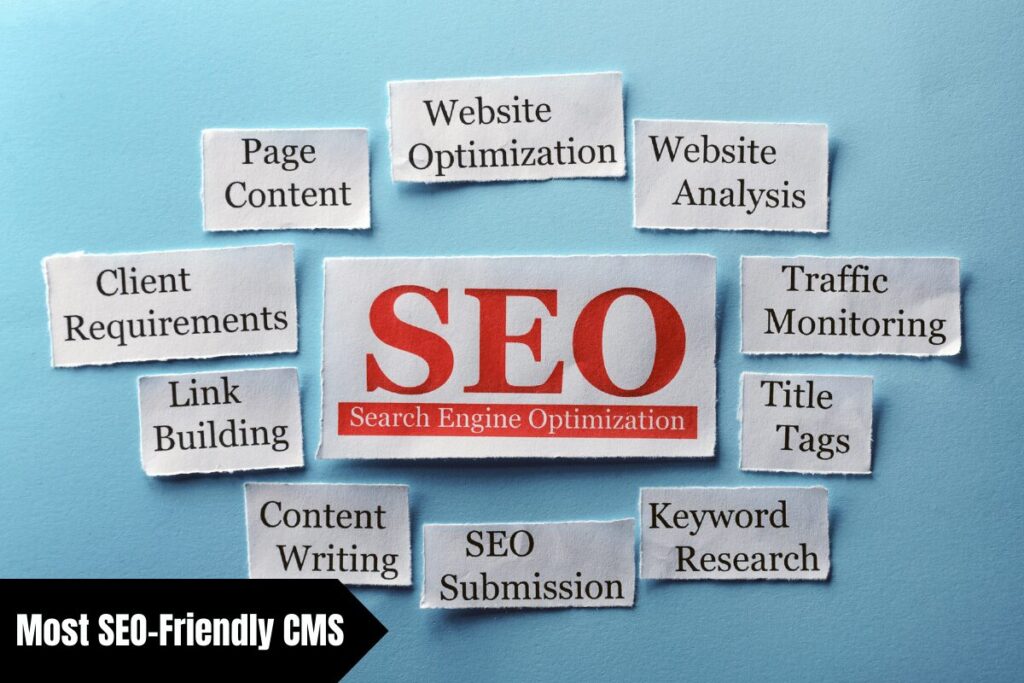
Unlocking SEO Success: How Your CMS Could Be Hurting Your Rankings
BlogLet’s get real for a second. How many times have you poured hours into optimizing content, tweaking meta tags, and chasing backlinks, only to realize your CMS (Content Management System) is basically working against you? We’ve been there too. If your CMS isn’t built with SEO in mind, you’re stuck playing a rigged game. But hey, no judgment—we’re here to geek out about SEO-friendly CMS platforms and how they can turn your site from invisible to irresistible.

Maximize Your SEO Potential with the Right CMS
BlogWhy Your CMS is the Secret Sauce for SEO Success (And How to Not Screw It Up) Hey there, fellow SEO nerds! Let’s cut to the chase: if you’re still treating your Content Management System (CMS) like a glorified Word doc, you’re leaving serious SEO wins on the table. We’ve all been there—obsessing over keywords and backlinks while ignoring the very foundation of our websites. But here’s the kicker: your CMS isn’t just a tool; it’s your SEO wingman. At Sitelinx Organic SEO Agency in Los Angeles, we’ve seen it all. From WordPress wizards to Shopify strugglers, the right CMS paired with smart SEO strategies can turn a “meh” site into a traffic magnet. So grab a coffee (or a kombucha, we don’t judge), and let’s geek out over how to make your CMS work harder than a barista during pumpkin spice season. Why Your CMS Choices Matter More Than Your Morning Coffee Let’s start with the basics: a CMS is the backbone of your website. It’s where you create, edit, and organize content. But here’s the thing—not all CMS platforms are created equal for SEO. Pick the wrong one, and you’ll spend hours fighting plugins, slow load times, and Google’s grumpy algorithms. Here’s what a SEO-friendly CMS should do for you: Automate technical SEO: Clean URLs, meta tags, and XML sitemaps without coding marathons. Play nice with plugins: Think Yoast for WordPress or Schema markup tools. Stay mobile-friendly: Because Google’s 2024 algorithm update isn’t going to care about your excuses. Ever tried doing SEO on a CMS that feels like it’s stuck in 2005? Yeah, it’s like trying to run a marathon in flip-flops. That’s why we’re obsessed with platforms like WordPress—its flexibility and SEO plugins (cough Rank Math cough) make it a no-brainer for businesses serious about growth. WordPress: The Beyoncé of CMS Platforms Let’s be real: WordPress owns 43% of the web for a reason. It’s like the Swiss Army knife of CMS platforms—flexible, scalable, and packed with SEO magic. Need proof? Why WordPress SEO services crush it: Plugins for days: Yoast, All in One SEO, and Redirection plugins make optimization a breeze. Total control: Customize .htaccess files, tweak permalinks, and manage redirects without begging your developer for help. Community support: Updates and security patches drop faster than TikTok trends. But here’s the catch: WordPress isn’t “set it and forget it.” Without proper website management, even the shiniest site can turn into a security risk or speed nightmare. (Pro tip: That’s where a best SEO company like Sitelinx swoops in. We handle the techy stuff so you can focus on creating killer content.) Local SEO & Your CMS: Why Your Neighborhood Matters If you’re a local business, your CMS needs to be your best hype person for neighborhood searches. Think: Location pages with embedded Google Maps. Schema markup for your address and hours. Google Business reviews integration (because 5-star ratings = SEO gold). Fun story: We once worked with a LA-based bakery that ranked #1 for “best croissants near me” just by optimizing their CMS for local keywords and adding a reviews widget. No black-hat tricks—just smart Local SEO and a CMS that didn’t fight them every step of the way. Technical SEO Services: The Unsexy Hero Your Site Needs Let’s talk about the elephant in the room: technical SEO. It’s not glamorous, but ignoring it is like building a mansion on quicksand. Here’s what to look for in a CMS: Speed optimization: Lazy loading images, caching plugins, and minifying CSS. Mobile responsiveness: Google’s mobile-first indexing isn’t a suggestion. Structured data: Schema markup that makes Google swoon. At Sitelinx, our technical SEO services include CMS audits to sniff out issues like broken links, duplicate content, and crawl errors. Because let’s face it—most of us’d rather binge Netflix than dig into server logs. Choosing the Best SEO Company: Don’t Get Catfished With so many “SEO experts” out there, how do you pick a winner? Here’s our cheat sheet: Look for transparency: If they won’t explain their strategy, run. Check reviews: A legit SEO agency will have rave Google Business reviews. Ask about CMS expertise: Your SEO is only as good as your platform. Shameless plug: We’ve been named one of the best SEO companies for small business because we speak human, not jargon. Whether you need WordPress SEO services or a full-site overhaul, we’ve got your back. 3 CMS SEO Mistakes That’ll Make Google Side-Eye You Ignoring updates: An outdated CMS is a hacker’s playground. Overloading plugins: Too many can slow your site to a crawl. Skipping mobile optimization: Mobile traffic isn’t the future—it’s now. Your Burning CMS SEO Questions, Answered Q: Does my CMS affect my local SEO? A: Absolutely! A CMS that supports location-based keywords and schema markup is crucial for ranking in local searches. Q: How often should I update my CMS? A: Monthly. Updates patch security holes and keep plugins running smoothly. Q: Can I switch CMS platforms without killing my SEO? A: Yes—with proper redirects and a marketing consultant who knows their stuff. Wrapping Up: Your CMS is Your SEO BFF At the end of the day, your CMS is more than a content hub—it’s the engine driving your SEO success. Whether you’re a WordPress warrior or exploring Shopify, the right setup paired with SEO services tailored to your needs can work wonders. And hey, if you’re feeling overwhelmed, remember: Sitelinx Organic SEO Agency is just a call away. We’re based in LA, but we’ll geek out over your site’s SEO no matter where you are. Let’s turn your CMS from a headache into your secret weapon. 😉 Ready to stop fighting your CMS and start ranking? Hit us up.
